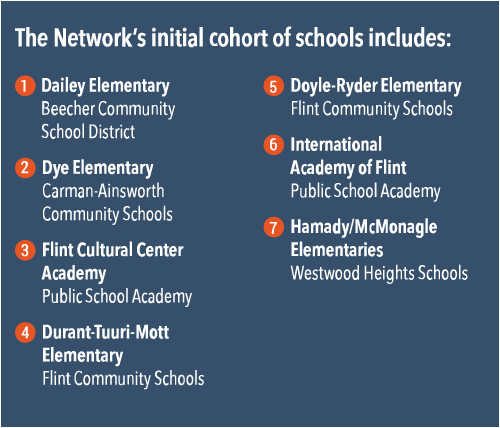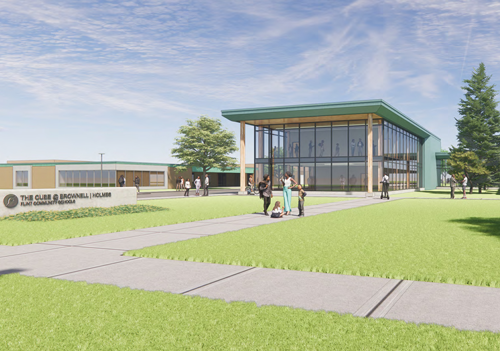“Educare Flint feels like a second home. The staff feels like family, always resourceful and focused on the inclusivity of all children and families. … [I]t’s given both of my children a high-quality early educational experience, and it’s also helped me grow as a parent and community leader.”
— Latrese Brown, Flint mom

Every child who lives in Flint should have the same opportunity to succeed as a child who lives in a more affluent community anywhere else in our state or country. Achieving that will require high-quality educational opportunities — from cradle to college and career — and collaboration among many community partners.
A quality education gives people a much better chance of finding a good job with a strong career path. Those with a post-secondary degree or credential are more likely to be employed and earn more — and much less likely to live in poverty.
In 2022, 40% of Flint residents who lacked a high school diploma lived below the poverty level, compared to 11.6% of Flint residents who earned a bachelor’s degree or higher.
This section looks at what programs, initiatives and organizations are doing to help strengthen educational opportunities in Flint, as well as what the Mott Foundation is supporting toward this effort.
Educare Flint and Cummings Great Expectations are among the strong early childhood education options for Flint families, designed to help kids get a solid start to school and life. Both schools focus on high quality experiences, high staff-to-child ratios, strong relationships with students and their families, and a pipeline of resources for the entire family. Despite the lingering impacts of the Flint water crisis, kids at Educare Flint and Cummings came through the COVID-19 pandemic without statistically significant increases in social-emotional challenges, compared with the 40% of their national peers who did.
K-12 education in Flint has experienced drastic changes over the years. Of the 16,445 school-age kids who live in Flint, approximately 3,000 of them are enrolled in Flint Community Schools. College- and career-readiness measures for Flint kids continue to trail state averages, increasing the need to address gaps for Black, Latino and economically disadvantaged students. Critical initiatives like community education and afterschool programming help to fill the gaps for students who need them the most.
Access to higher education also has expanded, with more opportunities for young people and adults to earn degrees and/or certificates. The Flint Promise provides free enrollment to Flint residents at Flint’s colleges and universities. The Michigan Reconnect program has recently expanded free community college enrollment. While eligibility previously began at age 25, now anyone who is 21 or older can benefit. The University of Michigan-Flint launched its Go Blue Guarantee program and the Direct Admission Pathway, both of which are intended to make it easier and more affordable for students to earn college degrees.
Through Focus on Flint surveys and community conversations, parents and guardians expressed their belief that our community needs to think differently about how to serve Flint kids. To see the bigger picture of education in the city, Mott Foundation staff worked with a research firm to gather and bring together information about Flint kids and where they attend school. Data presented in the following graphics tell more of that story.












SOURCES:
American Community Survey 2016-2020 5-Year Estimates
American Community Survey 2016-2020 5-Year Estimates Public Use Microdata Sample
Center for Educational Performance and Information, 2018-2019, 2020-2021, and 2021-2022
This report was created by Data Driven Detroit with support from the Charles Stewart Mott Foundation as a part of its Focus on Flint initiative.

To better serve Flint students no matter where they attend school, the Mott Foundation is supporting a coordinated approach to improving academic outcomes and well-being for Flint kids.
Launched in early 2023 with Mott funding to the Community Foundation of Greater Flint, the Flint Center for Educational Excellence leads and coordinates six cooperative efforts:
- Community education, which is a school-based holistic approach to supporting students and families with academic, enrichment, recreational, health, and other programs and services.
- Afterschool programming, which provides out-of-school-time activities and programs for students.
- The Flint Early Childhood Collaborative, which supports best practices in early learning.
- A Flint Parent Collaborative, which builds on existing avenues for engagement, creating opportunities for greater involvement and advocacy.
- A Community Council on Education, which brings together a broad set of stakeholders interested in bolstering the educational landscape in Flint.
- A Network for School Excellence, which is a cohort of schools that work together to improve educational outcomes.
Schools that are part of the Network will have support through afterschool programming and the community education initiative. In addition, the Mott Foundation granted a total of $1.75 million to support participation by eight Flint area schools in the Network. The grants are intended to provide more resources to create innovative solutions that will help improve student success, and school leaders have flexibility in how they can use the grant dollars.
The Mott Foundation is pleased to support these projects and initiatives, as well as provide additional grants for youth programming outside of schools offered through a variety of community-based organizations. In the coming year, the Foundation will continue to create spaces to listen to Flint kids and parents about how to best support the Flint educational ecosystem and ensure Flint kids thrive.

BROWNELL-HOLMES CAMPUS PROJECT
In December 2023, the Mott Foundation also supported upgrades at two FCS school buildings. The Foundation granted $14 million to FCS to support renovations to the Brownell STEM Academy and Holmes STEM Middle School campus on the city’s north side. In addition to supporting school renovations, Mott Foundation funds also will be used to construct The Cube, a 5,000-square-foot building that can be used by students, staff or residents throughout the school day, as well as during extended hours on mornings, evenings and weekends.

